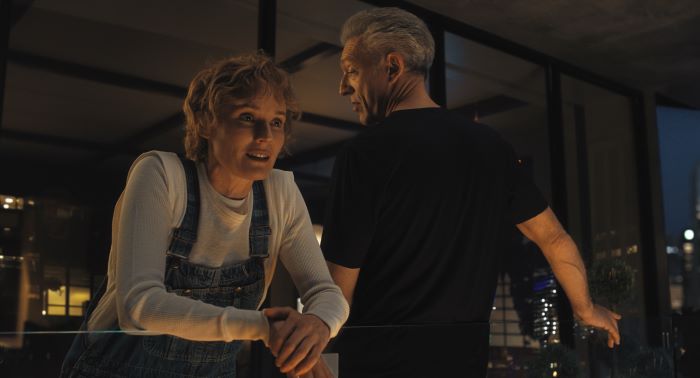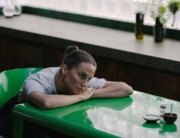While imperfect and occasionally static, David Cronenberg’s sci-fi noir The Shrouds has a brilliant concept at its core. An entrepreneur, Karsh (Vincent Cassel), mourning the death of his wife Becca (Diane Kruger) from cancer, creates a company called GraveTech, where bodies can be buried in a dark grey shroud that records their decomposition within their graves. They can be viewed and monitored on an app and on a screen atop the tombstone. The idea is eerie, well realized, and completely plausible: In an era of so much recording and selfies, why not prolong our recorded lives after death as well? The canny visual effects are slightly off-kilter, orange-tinted, and digital-looking, providing the viewer a sense of distance from the macabre material. Still, the shots of decaying bodies, mostly of Becca, are cuttingly severe and sad.
Perhaps Karsh’s visits with Becca’s twin sister Terry (also Kruger), a dog groomer, are a comforting reminder of his wife. Even Karsh’s Siri-like avatar, Hunny, is a slight doppelgänger of Becca. Hunny, voiced by Kruger too, is bright blonde and emoji-esque in a sleeveless black-and-white polka dot top, yet her vocal inflections are neither bubbly nor robotic. Instead, they have shadings of personality and wit. The humanistic artificial technology here, akin to Scarlett Johansson’s Samantha in Spike Jonze’s Her (2013), feels even closer now on a widespread level.
However, when Karsh’s GraveTech burial site is desecrated, he enlists Terry’s ex-husband, Maury (Guy Pearce), a grizzled hacker-type, to find out who’s responsible for the vandalism. Pearce, Kruger, and Sandrine Holt, as a potential love interest of Karsh, inject some life and buoyancy into the picture that often revolves around Cassel’s sense of staid stoicism. Meanwhile, multinational conspiracy theories abound that are somewhat murky on first watch. Perhaps there’s a relationship between the corpses in The Shrouds and the theories: Both never really resolve and remain mysterious.
Noticeably, the dialogue exchanges are blocked unimaginatively with characters sitting or standing, with little movement, making the pace feel sluggish. In some respects, much of the film behaves a bit like Cronenberg’s 2011 talky A Dangerous Method, despite its blazing sci-fi ingenuities. However, to dwell upon the occasional staginess and creaky plot is less interesting than to be swept up in its ideas, mood, and atmosphere. Karsh’s elegant, darkly lit living space, with a koi pond wrapped around his bed, is a masterly feat of production design by frequent collaborator Carol Spier. The long coats and shrouds have a cool, understated look in line with Cronenberg’s past films that would fit perfectly upon a Saint Laurent runway. (The house is one of the producers. The costume designer is Anne Dixon.)
The Shrouds is a little steelier and clinical, less woozy and gorily lush than his last movie, Crimes of the Future. Howard Shore’s wonderful music also illuminates their differences. The latter’s score has a more sweeping quality, with memorable, spiraling melodies, while the unsettling synths in The Shrouds have a flatter, existential, and minimalistic feel.
Also, it’s hard to ignore Cassel’s likeness to Cronenberg, with his broody expression and shock of silver hair. Cronenberg himself has said this film was made in response to his wife’s death. In that respect, The Shrouds emerges as a perverse elegy, though elements of autobiography aren’t necessary to experience it. Yet having a somewhat basic knowledge of Cronenberg and his work enriches his latest, with its mordant humor (the joke of the word “encryption,” for example) and brainy, sardonic societal commentary.
My New York Film Festival viewing of The Shrouds was interrupted about midway by two environmental protestors who unraveled a banner that read “No films on a dead planet” on the stage below the screen. They chanted this phrase over and over much to the audience’s annoyance. The devastating sadness of the message, and the strangeness of the moment, meshed well, in a cockeyed way, with Cronenberg’s film.

















Leave A Comment